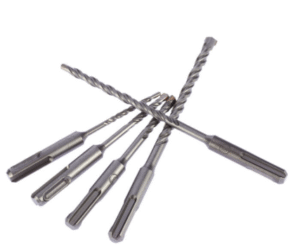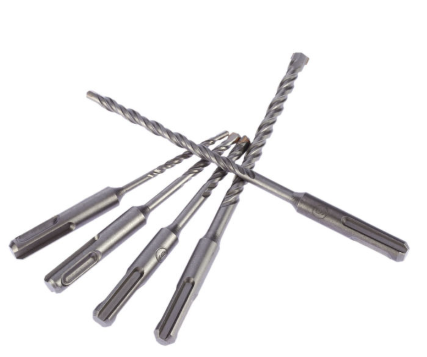- Heavy – Duty vs. Light – Duty Applications
For heavy – duty applications that require a lot of power and precision, such as large – scale construction projects or industrial manufacturing, square hammer drill bits are generally the preferred option. They can handle the high forces and continuous use required in these applications. On the other hand, for light – duty applications like home improvement projects, hanging pictures, or small – scale repairs, round hammer drill bits are often more than adequate. They are more affordable, easier to use, and can provide the necessary performance for these less demanding tasks.
- Precision and Delicate Work
When precision and delicate work are required, such as drilling small holes in tiles or in applications where the risk of damaging the surrounding material is high, round hammer drill bits are usually a better choice. Their smooth, circular rotation minimizes vibration and reduces the likelihood of chipping or cracking fragile materials. For example, when installing a towel bar in a ceramic bathroom tile, a round diamond – tipped hammer drill bit can create a clean, precise hole without shattering the tile. Square bits, with their more aggressive torque transfer and angular edges, are less suitable for such tasks, as the higher force and potential for wobble (even slight) can easily damage delicate surfaces. In precision tasks like drilling in glass – reinforced concrete or thin stone veneers, round bits also offer better control, allowing the user to adjust pressure gradually and avoid over – penetration.
- Diameter
The diameter of the hammer drill bit directly determines the size of the hole it creates, and this choice depends entirely on the application. For small – scale tasks like installing wall anchors for shelves, a round bit with a diameter of 3 – 6 mm is typically sufficient. In contrast, heavy – duty construction projects, such as drilling holes for concrete anchors to secure structural beams, may require square bits with diameters ranging from 10 mm up to 30 mm or more. Bosch’s SDS – Plus square bits, for instance, are available in diameters up to 25 mm, making them ideal for large – hole drilling in concrete foundations. Dewalt’s round bits, on the other hand, often max out at 12 – 16 mm in their standard lines, which aligns with their focus on general – purpose and light – duty use.
- Length
Bit length is another critical factor, as it determines how deep the hole can be drilled. Short bits (typically 100 – 150 mm) are suitable for shallow holes, such as those needed for hanging pictures or mounting light fixtures on walls. Longer bits (200 mm or more) are necessary for tasks that require drilling through thick materials, like penetrating a concrete wall for plumbing or electrical conduit installation. Makita’s HR2475 square bit series includes lengths up to 300 mm, designed for deep drilling in industrial settings, while Milwaukee’s SHOCKWAVE round bits offer lengths up to 250 mm, balancing reach with maneuverability for home and light – commercial use.
- Carbide Tips
Nearly all high – quality hammer drill bits, whether square or round, feature carbide tips. Carbide is an extremely hard material that can withstand the abrasion and impact of drilling into concrete, brick, and stone. The quality of the carbide tip varies by brand: Bosch’s Professional line uses a proprietary carbide alloy blended for maximum wear resistance, making their bits last up to 50% longer than standard carbide bits in continuous concrete drilling. Dewalt’s DWA1300 round bits use a precision – ground carbide tip that ensures sharpness retention, even when drilling through reinforced concrete with steel rebar.
- Steel Body
The body of the bit, which connects the tip to the shank, is typically made from high – carbon steel or alloy steel. Square bits often have thicker, more robust bodies to handle high torque—Makita’s 192461 – 5 square bit, for example, features a heat – treated alloy steel body that resists bending under heavy loads. Round bits, while still durable, may have slightly thinner bodies to reduce weight and improve rotation smoothness; Milwaukee’s 48 – 22 – 2120 round bit uses a high – speed steel body that balances strength with flexibility, preventing breakage in light – duty applications.
- Round Bits
Round hammer drill bits are generally more affordable than square bits, making them a cost – effective choice for DIY enthusiasts and occasional users. A basic set of Dewalt round bits (3 – 10 mm diameters) can cost between $15 – $30, while individual bits are often priced under $10. This lower cost is due to their simpler manufacturing process and broader market demand for general – purpose tools.
- Square Bits
Square bits, especially those designed for SDS – Plus or SDS – Max systems, are typically more expensive. A single Bosch Bulldog Xtreme square bit (10 mm diameter) can cost $15 – $25, and professional – grade sets range from $50 – $100. However, their durability and performance in heavy – duty tasks make them a worthwhile investment for professionals, as they reduce the need for frequent replacements. Over time, the longer lifespan of square bits can offset their higher initial cost in high – usage scenarios.
Proper maintenance is essential to extend the lifespan of both square and round hammer drill bits, ensuring consistent performance and preventing premature wear.
After drilling, bits should be cleaned to remove debris like concrete dust, brick particles, or wood shavings. For square bits, the flat sides and corners can trap debris, so using a stiff brush or compressed air to dislodge particles is important. Round bits, with their smooth surfaces, are easier to clean but still require thorough brushing to remove residue that can cause corrosion. For stubborn debris, soaking bits in warm, soapy water for 10 – 15 minutes before scrubbing is effective.
Regular inspection helps identify signs of wear that can affect performance. For carbide tips, look for chipping, dullness, or uneven wear—if the tip is damaged, the bit will drill more slowly and may produce 粗糙 holes. For square bits, check the shank for bending or deformation, as this can reduce torque transfer and cause slipping in the chuck. Round bits should be inspected for straightness; a bent round bit will wobble during drilling, leading to inaccurate holes and increased vibration.
Storing bits correctly prevents damage and corrosion. Both square and round bits should be kept in a dry, cool place, ideally in a dedicated bit case or organizer. This protects them from moisture, which can cause rust, and prevents them from rubbing against each other, which can dull the tips. Some professional cases, like those included with Bosch’s premium bit sets, have foam inserts with labeled slots to keep bits organized and secure, reducing the risk of accidental damage during transport.

In addition to the HDS18V – LI and Bulldog Xtreme models, Bosch offers the Professional SDS – Max Square Bits for heavy – duty industrial use. These bits are designed for SDS – Max drills, which deliver higher impact energy than SDS – Plus systems. The SDS – Max bits feature a larger square shank (18 mm across) and are available in diameters up to 40 mm, making them suitable for drilling in thick concrete slabs or rock. They use a reinforced carbide tip with a special geometry that allows for faster penetration, reducing drilling time in large – scale projects like bridge construction or tunnel boring.
Makita’s square bit lineup also includes the HR4002 series, designed for use with their 110V heavy – duty hammer drills. These bits have a precision – ground square shank that ensures a perfect fit in Makita’s proprietary chucks, eliminating any play during operation. The HR4002 bits are coated with a black oxide finish to resist corrosion, and their carbide tips are brazed using high – temperature techniques for maximum bonding strength, preventing tip separation even under extreme impact.
Dewalt’s round bit offerings extend to the DWA5821 Diamond Grit Round Bits, specifically designed for drilling in hard, brittle materials like porcelain tile and natural stone. These bits feature a diamond – encrusted tip that grinds through material rather than cutting, reducing the risk of chipping. The shank is hexagonal, providing a secure grip in standard chucks, and the body is reinforced with a steel core to prevent bending. The DWA5821 is a favorite among contractors specializing in bathroom and kitchen renovations, where precise tile drilling is critical.
Milwaukee’s SHOCKWAVE round bits are part of a broader lineup that includes the SHOCKWAVE SDS – Plus Adapter Bits, which combine a round shank with a square SDS – Plus adapter. This hybrid design allows users to use round bits in SDS – Plus drills, bridging the gap between versatility and power. The adapter is made from forged steel for durability, and the bits retain the SHOCKWAVE’s signature heat – treated body, making them suitable for both light and medium – duty masonry work.
Hammer drill bits are available in both square and round shapes, each with distinct advantages tailored to specific applications. Square bits excel in heavy – duty tasks requiring high torque transfer and durability, making them indispensable in construction, industrial manufacturing, and large – scale masonry work. Brands like Bosch and Makita offer premium square bits, such as the Bulldog Xtreme and HR2475, designed to withstand the rigors of continuous high – power drilling.
Round bits, on the other hand, shine in versatility, precision, and affordability. They are ideal for home improvement projects, light – duty masonry, and delicate work like tile drilling. Dewalt’s DW1351 and Milwaukee’s 48 – 22 – 2120 are excellent examples, providing reliable performance for DIYers and professionals alike in less demanding scenarios.
When choosing between square and round hammer drill bits, consider the material being drilled, the type of drill in use, the application’s demands (heavy – duty vs. light – duty), and factors like size, length, and cost. Proper maintenance, including cleaning, inspection, and storage, will ensure that whichever bit you choose performs optimally for years to come. By understanding the unique characteristics of each shape and matching them to your specific needs, you can select the perfect hammer drill bit to get the job done efficiently and effectively.


